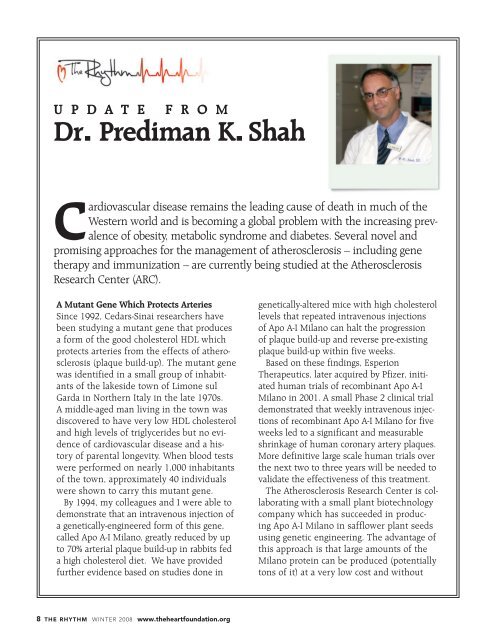NEWSMAGAZINE FOR THE HEART FOUNDATION
NEWSMAGAZINE FOR THE HEART FOUNDATION
NEWSMAGAZINE FOR THE HEART FOUNDATION
Create successful ePaper yourself
Turn your PDF publications into a flip-book with our unique Google optimized e-Paper software.
U P D A T E F R O M<br />
Dr. Prediman K. Shah<br />
Cardiovascular disease remains the leading cause of death in much of the<br />
Western world and is becoming a global problem with the increasing prevalence<br />
of obesity, metabolic syndrome and diabetes. Several novel and<br />
promising approaches for the management of atherosclerosis – including gene<br />
therapy and immunization – are currently being studied at the Atherosclerosis<br />
Research Center (ARC).<br />
A Mutant Gene Which Protects Arteries<br />
Since 1992, Cedars-Sinai researchers have<br />
been studying a mutant gene that produces<br />
a form of the good cholesterol HDL which<br />
protects arteries from the effects of atherosclerosis<br />
(plaque build-up). The mutant gene<br />
was identified in a small group of inhabitants<br />
of the lakeside town of Limone sul<br />
Garda in Northern Italy in the late 1970s.<br />
A middle-aged man living in the town was<br />
discovered to have very low HDL cholesterol<br />
and high levels of triglycerides but no evidence<br />
of cardiovascular disease and a history<br />
of parental longevity. When blood tests<br />
were performed on nearly 1,000 inhabitants<br />
of the town, approximately 40 individuals<br />
were shown to carry this mutant gene.<br />
By 1994, my colleagues and I were able to<br />
demonstrate that an intravenous injection of<br />
a genetically-engineered form of this gene,<br />
called Apo A-I Milano, greatly reduced by up<br />
to 70% arterial plaque build-up in rabbits fed<br />
a high cholesterol diet. We have provided<br />
further evidence based on studies done in<br />
genetically-altered mice with high cholesterol<br />
levels that repeated intravenous injections<br />
of Apo A-I Milano can halt the progression<br />
of plaque build-up and reverse pre-existing<br />
plaque build-up within five weeks.<br />
Based on these findings, Esperion<br />
Therapeutics, later acquired by Pfizer, initiated<br />
human trials of recombinant Apo A-I<br />
Milano in 2001. A small Phase 2 clinical trial<br />
demonstrated that weekly intravenous injections<br />
of recombinant Apo A-I Milano for five<br />
weeks led to a significant and measurable<br />
shrinkage of human coronary artery plaques.<br />
More definitive large scale human trials over<br />
the next two to three years will be needed to<br />
validate the effectiveness of this treatment.<br />
The Atherosclerosis Research Center is collaborating<br />
with a small plant biotechnology<br />
company which has succeeded in producing<br />
Apo A-I Milano in safflower plant seeds<br />
using genetic engineering. The advantage of<br />
this approach is that large amounts of the<br />
Milano protein can be produced (potentially<br />
tons of it) at a very low cost and without<br />
8 <strong>THE</strong> RHYTHM WINTER 2008 www.theheartfoundation.org


